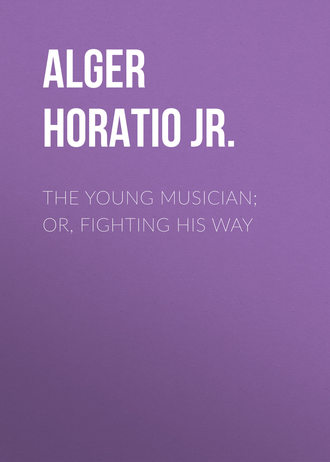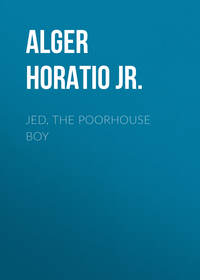
The Young Musician; Or, Fighting His Way
Evidently he was drawing near a village, for houses began to appear at nearer intervals.
“Hello, my boy! Where are you traveling!” asked a hearty voice.
Philip turned round, and his glance rested on a stout young farmer, whose face, though very much sunburned, was pleasant and good-natured.
“I don’t know,” answered Philip.
“Don’t know?” was repeated in surprise.
“I am in search of work.”
“Oh, that’s it! Are you a musician?” asked the young man, looking at the violin.
“Yes; a little of one.”
“Are you looking for a job at fiddling?” asked the young man.
“Yes, if I can find one,” answered Philip, smiling.
“Can you play dancing-music?”
“Yes.”
“Then I guess I can get you a job for this evening.”
“I wish you could,” said Philip hopefully, catching at a way out of his troubles.
“You see, there’s to be a little dance in School-house Hall to-night,” said the farmer; “or there was to be one, but the fiddler’s took sick, and we was afraid we’d have to give it up. Now, if you’ll take his place, we can have it, after all.”
“I’ll do it,” said Philip promptly.
“What’ll you charge?”
“How much was the other one going to charge?”
“Five dollars. You see, he would have to come six miles.”
“I’ll come for three dollars and my supper and lodging,” said Philip.
“All right! You shall have supper and lodging at our house. There it is, down that lane. Come right along, for supper must be on the table. After supper I’ll go and tell the committee I’ve engaged you.”
Philip’s spirits rose. Help had come from an unexpected quarter. He felt that a new career was opening before him.
CHAPTER XIX. NEW ACQUAINTANCES
On his way to the farmhouse, Philip ascertained that his companion’s name was Abner Webb, and that he and his brother Jonas carried on a farm of about a hundred acres. Abner appeared to be about twenty-five years old.
“You seem pretty young to be a fiddler,” said the young man, surveying Philip with a glance of curiosity.
“I am almost sixteen.”
“I am twenty-five, and I can’t play at all.”
“It isn’t all in the age,” returned our hero. “Did you ever try to learn?”
“Yes, I took one or two lessons, but I had to give it up for a bad job. I couldn’t get into it somehow.”
“You didn’t try very long,” said Philip, smiling.
“I reckon I’d never do much at it. How long have you been a fiddler?”
“I’ve been playing three or four years.”
“Sho! You don’t say so! Do you like it?”
“Yes; very much.”
“Well, I’m glad you happened along. It would have been a pity to have our dance spoiled.”
By this time they had reached the farmhouse, and Abner went in, followed by our hero.
A young woman, his brother’s wife, looked at Philip in some surprise.
“You see, I’ve got a fiddler, after all,” said Abner gleefully. “We won’t have to put off the dance.”
As he spoke, his brother Jonas came into the room, and the explanation was repeated.
“That’s good,” said Jonas heartily. “You’d better go down to the store after supper, Abner, and tell the boys, for they’ve just heard that Paul Beck can’t come.”
“You just save me some supper, and I’ll go now. The boy’ll stay with us to-night. That’s the bargain I made with him.”
“He’s heartily welcome,” said Jonas Webb, a pleasant-faced man, with sandy complexion, who was probably from two to three years older than his brother. “You’ve happened along just at the right time.”
“I am glad of it,” said Philip; and there is no doubt he was sincere, for we know how much he stood in need of employment, though he naturally did not care to let his new friends know of his destitution.
“My brother didn’t tell me your name,” said Jonas.
“My name is Philip Gray,” answered our hero.
“Do you go round playing for dances?” inquired Jonas.
“I have only just begun.”
Philip didn’t think it necessary to say that the idea of making money in this way had never occurred to him till this very day.
“Sit right up to supper, Jonas, and you, too, Mr. Gray,” said Mrs. Webb.
Philip was by no means loath, for the dishes which he saw on the table had had the effect of stimulating his appetite, already sharpened by his long walk and long fast.
Philip, as the guest, was first helped to a bountiful supply of cold meat, a hot biscuit, and some golden butter, not to mention two kinds of preserves, for the Webbs always lived well. He was not slow in doing justice to the good supper spread before him. He was almost afraid to eat as much as he wanted, lest his appetite should attract attention, and, therefore, was pleased to see that Jonas quite kept pace with him.
Indeed, when he had already eaten as much as he dared, Mrs. Webb said, hospitably:
“I am afraid, Mr. Gray, you won’t make out a supper.”
“I don’t think there is any danger of that,” said Philip, smiling. “I have enjoyed my supper very much.”
The young woman looked gratified by this tribute to her cooking, and just then Abner came in.
“Did you see the boys, Abner?” asked Jonas.
“Yes, I saw them all. They were awfully glad we could have the dance, after all. You see, we’ve been lookin’ forward to it, and didn’t like to be disappointed. And now I must hurry down my supper, for I’ve got to slick up and go for Mary Ann Temple. Are you goin’, Lucy?”
“Of course she is,” answered Jonas. “I don’t have so far to go for my girl as you do,” he added slyly.
“You used to go farther once, Jonas—six miles, where I have only to go two.”
When supper was over, Philip inquired:
“How early will the dance commence?”
“About eight. We keep early hours in the country, and we like to get our money’s worth.”
“If you have no objection, I will go out to the barn and try my violin a little to see if it is in good tune.”
“Try it in the next room,” said the farmer’s wife.
“Yes, do!” said her husband. “We’d like to hear you.”
He was a little afraid, judging from Philip’s youth, that he could not play very well, and this would give him an opportunity of deciding how competent the boy was to take the place of Paul Beck, of Pomfret, who had quite a reputation in the towns around.
Philip went into the next room and began to prepare himself for his evening’s task. Though lus training had by no means been confined to dancing-tunes, he was quite proficient in that department, having more than once been called upon in Norton to officiate in a similar capacity.
When Jonas had listened for five minutes to Philip, he turned to Abner with a satisfied look.
“He understands his business,” he said, nodding with emphasis. “He ain’t no new beginner.”
“I think he beats Paul Beck,” said Abner, delighted to find his choice approved.
“I don’t know but he does. I feel as if I wanted to start off now.”
“I don’t see how he does it,” said Abner, with a puzzled look. “I never could do anything at it, though I’m almost twice as old.”
He passed into the room where Philip was practising.
“You’re a tip-top player,” said he, to Philip admiringly. “Why, you beat Paul Beck.”
“Is he the one you expected to have?”
“Yes. Paul’s got a big name for fiddlin’.”
“I am glad you like my playing,” said Philip, who was naturally pleased to find that he was likely to give satisfaction in his new business.
“The boys will be pleased, I can tell you.”
“I will do all I can to give them satisfaction,” said Philip modestly.
“Oh, you will! there’s no doubt about that. How much did you pay for your fiddle?”
“I believe it cost twenty-five dollars. My father gave it to me.”
“Sho! I didn’t think fiddles cost so much.”
“Some cost a great deal more.”
“Seems a good deal to lay out, but you’ll get your money back, if you can get enough to do.”
“I hope so.”
“Well, you must excuse me now. I’ve got to slick up, and go after Mary Ann Temple. She’d have been awfully disappointed if we’d had to give it up.”
“Is she fond of dancing?”
“You’d better believe she is. Why, that girl could dance for four hours stiddy—without wiltin’!”
“How late do you keep it up?”
“Till eleven or twelve. You won’t be sleepy, will you?”
“If I am, I will get up later to-morrow morning.”
“That’s all right. You can get up jest as late as you like. Lucy will save you some breakfast. We don’t allow no one to go hungry here. But I must be off. You will go to the hall along with Jonas and Lucy. They’ll introduce you round and see that you are taken care of.” Philip congratulated himself on being so well provided for, at least for one night. The future was uncertain, but with the money which he was to receive for his services, he would be able to get along for two or three days, and he might, perhaps, if successful, obtain another similar engagement.
He had a new reason for being thankful that Squire Pope had not succeeded in depriving him of his violin, for this was likely to prove a breadwinner.
He continued to practice till it was time to go over to the hall.
CHAPTER XX. A LIVELY EVENING
Schoolhouse Hall, as may be inferred, was a large hall, occupying the second story of the Center Schoolhouse, and though not originally intended for dancing-parties, answered very well for that purpose.
The hall was tolerably well filled when Philip entered in company with Jonas Webb and his wife.
Philip had effaced, as well as he could, the stains of travel, had arrayed himself in a clean shirt and collar, brushed his hair neatly, and, being naturally a very good-looking boy, appeared to very good advantage, though he certainly did look young.
As he walked through the hall, with his violin under his arm, he attracted the attention of all, it having been already made known that in place of the veteran Paul Beck—a man of fifty or more—an unknown boy would furnish the music for the evening.
Philip could not avoid hearing some of the remarks which his appearance excited. “What! that little runt play the fiddle?” said one countrified young man, in a short-waisted blue coat, and tow-colored hair, plastered down on either side of his head with tallow. “I don’t believe he can play any more than I can.”
“I hope he can,” retained his partner—a plump, red-cheeked, young farmer’s daughter. “He’s very good-looking, anyhow.”
“He isn’t anything to brag of,” said her partner jealously.
“Oh, how can you say so, Jedidiah. I See what beautiful black hair and eyes he’s got, and such a lovely color on his cheeks!”
Now, Jedidiah, in appearance, was just the reverse of Philip. His hair, as already stated, was tow-color, his face was tanned, and the color rather resembled brick-dust than the deep red of our hero’s cheeks.
His partner was a rustic flirt, and he was disposed to be jealous, not being certain how far she favored him. He, therefore, took offense at his partner’s admiration of the young fiddler.
“He looks very common to me,” said Jedidiah pettishly. “You’ve got a strange taste, Maria.”
“Perhaps I have, and perhaps I haven’t,” retorted Maria, tossing her head.
“Perhaps you’re in love with him?” continued Jedidiah, in a tone meant to be sarcastic.
“I should be if he was a little older,” said the young lady, rather enjoying her lover’s displeasure.
“I don’t believe he can play at all,” growled Jedidiah. “He’s fooled Abner Webb, like as not. It’s a pity we couldn’t have Paul Beck.”
“Very likely he can play better than Paul Beck,” said Maria—not because she thought so, but because she knew it would tease her partner.
“Don’t be a fool, Maria,” said Jedidiah, scarcely conscious of the impoliteness of his speech.
The young lady, however, resented it at once.
“I am sure you are very polite, Mr. Jedidiah Burbank—so polite that I think you had better find another partner!”
“Excuse me, Maria,” said Jedidiah hastily, alarmed at the prospect of being left without a partner. “Of course, I didn’t mean anything.”
“If you didn’t mean it, what made you say it?” retorted Maria, tossing her head. “I ain’t used to being called a fool. I never knew a gentleman to make such a remark to a lady. I think you’d better find some other partner.”
“I take it all back,” said Jedidiah, in alarm. “I was only in fun.”
“I don’t like that kind of fun,” said Maria, in a tone of dignified coldness.
“Then I won’t joke you again. I guess he can play well enough, if Abner says so.”
Miss Maria Snodgrass allowed herself to be propitiated, more especially as she herself might have been left without a partner, had she adhered to her determination and sent Jedidiah adrift.
He took his place in a quadrille, not exactly wishing Philip to fail, but rather hoping that he would prove a poor performer, in order that he might have a little triumph over Maria, who had the bad taste to prefer the young musician’s appearance to his.
Meanwhile Philip, following Jonas Webb across the room, had been introduced to Frank Ingalls, who acted as manager.
“I am glad to see you, Mr. Gray,” said Ingalls. “I hope we sha’n’t make you work too hard. We are very fond of dancing here.”
“I don’t get tired very easily,” answered Philip. “I hope you will be satisfied with my playing.”
“No fear of that, Mr. Ingalls, I’ve heerd him play at home, and I tell you he can do it.”
“Thank you, Mr. Webb,” said Philip, bowing his acknowledgment of the compliment.
“I guess we may as well commence, Mr. Gray,” said Mr. Ingalls. “The boys seem to be getting impatient. Here’s the order of dances for the evening.”
“Very well, Mr. Ingalls.”
The manager raised his voice, and said, “Gentlemen and ladies, you already know that Beck is sick, and cannot be with us this evening, as he engaged to do. In his place we have engaged a young musician, who has already gained a great reputation in his profession—”
Philip was rather surprised to hear this, but it was not for him to gainsay it.
“Let me introduce to you Mr. Philip Gray.”
Philip bowed and smiled, and, putting his violin in position, immediately commenced a lively air.
In less than five minutes the manager felt perfectly at ease concerning the young musician. It was clear that Philip understood his business. Philip himself entered into the spirit of his performance. His cheek flushed, his eyes sparkled, and he almost outdid himself.
When the first dance was concluded, there was a murmur of approval throughout the ballroom. The dancers were both surprised and pleased.
“He’s a smart boy!” said more than one. “He plays as well as Paul Beck, and Paul’s been play-in’ for more’n twenty years.”
“As well? I never heard Paul Beck play as well as that,” said another.
Among those who were most pleased was Miss Maria Snodgrass.
“What do you think now, Mr. Burbank?” she said, addressing her partner. “Do you think the boy can play now?”
“Yes, he can play most as well as Paul Beck,” admitted Jedidiah.
“Most as well? Paul Beck can’t begin to play as well as him,” returned Maria, who was not educated, and occasionally made slips in grammar.
“Just as you say, Maria,” answered Jedidiah, submissively; “only don’t call me Mr. Burbank.”
“Why? Ain’t that your name?” asked the young lady demurely.
“Not to you, Maria.”
“Well, I won’t, if you’ll take me up and introduce me to Mr. Gray.”
“What for?” asked Jedidiah jealously.
“Because I want to know him.”
Mr. Burbank was obliged to obey the request of his partner.
“Oh, Mr. Gray, you play just lovely!” said Miss Snodgrass rapturously.
“Thank you for the compliment,” said Philip, with a low bow.
“I like your playing ever so much better than Paul Beck’s.”
“You are too kind,” said Philip, with another bow.
“Isn’t he just lovely, Jedidiah!” said Maria, as she walked away with her lover.
“Maybe he is—I ain’t a judge!” said Mr. Burbank, not very enthusiastically.
So the evening passed. Philip continued to win the favorable opinion of the merry party by his animated style of playing.
When at half-past eleven the last dance was announced, he was glad, for after his long walk, and the efforts of the evening, he felt tired.
At the conclusion, Mr. Ingalls handed him three dollars, saying:
“Here’s your money, Mr. Gray, and we are much obliged to you besides.”
“Thank you!” said our hero, carelessly slipping the money into his vest pocket.
The manager little imagined that it constituted his entire capital.
“I hope we may have you here again some time, Mr. Gray,” continued the manager.
“Perhaps so,” said Philip; “but I am not sure when I shall come this way again.”
“Good night, Mr. Gray,” said Miss Snodgrass effusively. “I should be glad to have you call at our house.”
Philip bowed his thanks. He did not notice the dark cloud on the brow of the young lady’s escort.
CHAPTER XXI. FORTUNE SMILES AGAIN
Notwithstanding his exertions during the day and evening, Philip rose the next day at his usual hour, and was in time for the family breakfast, at seven o’clock.
“Don’t you feel tired, Mr. Gray?” asked Mrs. Webb.
“No, thank you. I slept well, and feel quite refreshed.”
“He’s used to it, Lucy,” remarked her husband.
“They look upon me as a professional player,” thought Philip.
“I think you and I ought to be more tired, for we were dancing all the evening,” continued the farmer.
When they rose from the table, Philip looked for his hat.
“You’re not going to leave us so soon, Mr. Gray?” said Mrs. Webb hospitably. “We shall be glad to have you stay with us a day or two, if you can content yourself.”
“That’s right, Lucy. I’m glad you thought to ask him,” said her husband.
Philip was tempted to accept this kind invitation. He would have free board, and be at no expense, instead of spending the small sum he had earned the evening previous; but he reflected that he would be no nearer solving the problem of how he was to maintain himself, and while this was in uncertainty, he was naturally anxious.
“I am very much obliged to you both,” he said. “If I come this way again, I shall be glad to call upon you, but now I think I must be pushing on.”
“You’ll always be welcome, Mr. Gray,” said Mrs. Webb.
Philip thanked her, and soon after set out on his way.
He was more cheerful and hopeful than the day before, for then he was well nigh penniless, and now he had three dollars in his pocket.
Three dollars was not a very large sum, to be sure, but to one who had been so near destitution as Philip it seemed very important.
Besides, he had discovered in his violin a source of income, whereas, hitherto, he had looked upon it merely as a source of amusement. This made him feel more independent and self-reliant.
He had walked perhaps two miles, when he heard the rattle of wheels behind him. He did not turn his head, for there was nothing strange in this sound upon a frequented road. He did turn his head, however, when he heard a strong voice calling “Hello!”
Turning, he saw that a young man who was driving had slackened the speed of his horse, and was looking toward him.
Philip halted, and regarded the driver inquiringly.
“You’re the young chap that played for a dance last night, ain’t you!” said the newcomer.
“Yes, sir.”
“Then you’re the one I want to see—jump in, and we’ll talk as we are going along.”
Philip had no objection to a ride, and he accepted the invitation with alacrity. The driver, he noticed, was a young man, of pleasant manners, though dressed in a coarse suit.
“I drove over to Jonas Webb’s to see you, and they told me you had just gone,” he continued. “I thought maybe you’d get up late, but you was up on time. Are you engaged for this evening?”
Philip began to prick up his ears and become interested. Was it possible that his good luck was to continue, and that he was to have an opportunity of earning some more money through his faithful friend, the violin? He didn’t think it well to exhibit the satisfaction he felt, and answered, in a matter-of-fact tone;
“No, I have no engagement for this evening.”
“I’m glad of it,” responded the young man, evidently well pleased. “You see, we had arranged to have a dance over to our place, but Mr. Beck, being sick, we thought we’d have to give it up. One of my neighbors was over last evening and heard you play, and he thought maybe we could secure you.”
“I shall be glad to play for you,” said Philip politely.
“What are your terms?” asked his companion.
“Three dollars and board and lodging for the time I need to stay.”
“That’s satisfactory. I’ll engage you.”
“Is it near here?” asked Philip.
“It’s in Conway—only four miles from here. I’ll take you right over now, and you shall stay at my house.”
“Thank you, I shall find that very agreeable,” said Philip.
“Does Mr. Beck live near you?” asked our hero, a little later.
“Bless you! he lives in our place.”
“I suppose his services are in demand?”
“Yes, he is sent for to all the towns around. Fact is, there isn’t anybody but he that can play to suit; but I expect, from what I’ve heard, that you can come up to him.”
“I couldn’t expect to do that,” said Philip modestly. “I am very young yet.”
“Folks do say you beat Paul. It seems wonderful, too, considering how young you are. What might be your age, now?”
“Just sixteen.”
“Sho! you don’t say so? Why, Paul Beck’s over fifty.”
“Mr. Beck won’t think I’m interfering with him, will he?” asked Philip.
“Of course, he can’t. We’d a had him if he was well. We can’t be expected to put off the party because he’s sick. That wouldn’t be reasonable, now, would it?”
“I should think not.”
Just then Philip became sensible that a light wagon was approaching, driven by a young lady.
He did not, however, suppose it was any one he knew till the carriage stopped, and he heard a voice saying:
“Good morning, Mr. Gray!”
Then he discovered that it was the same young lady who had asked for an introduction to him the evening previous.
“Good morning, Miss Snodgrass!” he said politely, remembering, fortunately, the young lady’s name.
Meanwhile, Maria and Philip’s drivers had also exchanged salutations, for they were acquainted.
“And where are you carrying Mr. Gray, Mr. Blake?” she asked.
“I’m carrying him over to our place. He’s going to play for us this evening.”
“Is there going to be a dance in Conway this evening?” inquired Miss Snodgrass, with sudden interest.
“Yes. Won’t you come over?”
“I will, if I can get Jedidiah to bring me,” answered Maria.
“I guess there’s no doubt about that,” answered Andrew Blake, who knew very well Jedidiah’s devotion to the young lady.
“Oh, I don’t know!” answered Maria coquettishly. “Perhaps he won’t care for my company.”
“If he doesn’t, you won’t have any trouble in finding another beau.”
After a little more conversation, the young lady drove away; but not without expressing to Philip her delight at having another chance to hear his beautiful playing.
“She’ll be there,” said Andrew Blake, as they drove away. “She makes Jedidiah Burbank do just as she orders him.”
“Are they engaged?” asked our hero.
“Yes, I expect so; but there may be some chance of your cutting him out, if you try. The young lady seems to admire you.”
Philip smiled.
“I am only a boy of sixteen,” he said. “I am too young to think of such things. I won’t interfere with Mr. Burbank.”
“Jedidiah’s apt to be jealous,” said Blake, “and Maria likes to torment him. However, she’ll end by marrying him, I guess.”
In half an hour or thereabouts, Andrew Blake drew up at the gate of a small but neat house on the main street in Conway. He was a carpenter, as Philip afterward found, and had built the house himself. He was probably of about the same age as Jonas Webb, and like him was married to a young wife.
During the afternoon, Philip, being left pretty much to his own devices, took a walk in and about the village, ascending a hill at one side, which afforded him a fine view of that and neighboring villages.
He was pleasantly received and hospitably entertained at the house of Mr. Blake, and about quarter of eight started out for the hall, at which he was to play, in company with his host and hostess.
As they approached the hall, a young man approached them with a perplexed face.









